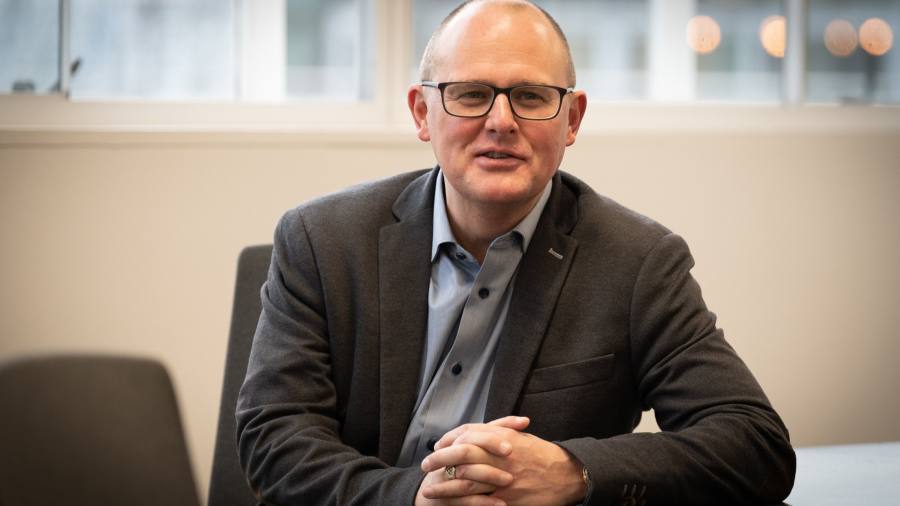[ad_1]
Unions will take the government to court if it tries to ram through legislation to curb the right to strike instead of sitting down to negotiate on pay with public sector workers, according to the incoming head of the Trades Union Congress.
Paul Nowak, a cheerful Everton football fan who first joined a union as a 17-year-old working at the supermarket Asda, is taking the helm at the TUC at a make or break moment for the UK’s organised labour movement.
A wave of public sector strikes, which will intensify in the new year, could revitalise unions after a long period of declining membership. But to win, they must keep public opinion onside and convince their members that strike action will pay off, halting a slide in real wages that began in 2008.
Meanwhile, Rishi Sunak, the prime minister, has pledged to bring forward “new, tough laws” to limit unions’ power.
“We’re expecting something big,” said Nowak, who in January will officially take his post as general secretary of the TUC, an umbrella group that acts as the voice of 48 member unions across the UK.
He said a “comprehensive” package of measures in early January could include a proposal to lengthen the notice unions must give employers of any action, as well as mandating a minimum service during strikes in key sectors.
Such measures would “make a mockery” of previous government pledges to bolster workers’ rights after Brexit. Combined with existing restrictions, they could “undermine the fundamental right to strike”, in breach of international conventions, and lay the government open to challenge at the European Court of Human Rights, Nowak argued.
“Our unions will still find ways . . . to take effective action but we’ll challenge it legally and we’ll make them pay a high political price for it,” he told the Financial Times.
Nowak believes the government is making a political miscalculation in refusing to revisit this year’s public sector pay deals, accusing ministers of discrediting the independent pay review bodies by using them as a “human shield” for decisions taken in Downing Street.
With workers facing “the longest squeeze on earnings in modern history”, ministers’ claims that higher pay would stoke inflation or strain the public finances were “nonsense”, he said.
He also said Steve Barclay, the health secretary, would only worsen the NHS recruitment crisis by “slagging off his own staff” with his “grotesque” accusation that they were putting lives at risk.
“There is a massive problem in our NHS . . . regardless of our members,” he said. “If there were no unions or strike action . . . there would still be a staffing crisis in the NHS.”
Bringing the government to the negotiating table is the first challenge Nowak must grapple with as he succeeds Frances O’Grady at the TUC — 25 years after she recruited him into the Organising Academy, a training scheme she set up to try to halt the decline in trade union membership.
That first cohort of recruits also included Roz Foyer, general secretary of the Scottish TUC, and Sharon Graham, general secretary of Unite — the UK’s biggest private sector union.
They front a new generation of trade union leaders who emphasise practical action to improve pay and working conditions, over efforts to influence internal Labour party intrigues.
Nowak himself is a longstanding member of the Labour party, who once missed out on a job in financial services after telling the interviewer he was reading Leon Trotsky’s The First Five Years of the Communist International. But he describes himself as “a trade unionist first and foremost”.
However, he will have to manage splits within the trade union movement, with some leaders keen to turn the current wave of strikes into an overtly political campaign akin to a general strike.
There is also tension brewing between unions and Labour after Sir Keir Starmer in the summer banned MPs from appearing on picket lines. The Labour leader has made it clear that, if in power, he too would refuse demands for a public sector pay rise matching inflation.
Nowak played down talk of a general strike, pointing out that any such mass walkout would likely fall foul of trade union legislation, and would make little sense to groups as disparate as teachers and physiotherapists who were worried about pay, but hardly inclined to militancy.
“What I’m interested in . . . is not the grand political gesture, I’m interested in helping unions win their disputes,” he said.
He was also relaxed about Starmer’s approach, arguing that the Labour leader’s promise to repeal Conservative anti-strike legislation from 2016 — and any measures that might be passed next year — mattered more than his refusal to let shadow ministers to “take a selfie” on the picket lines.
Even more important to Nowak — who spent his early career in a string of insecure jobs in parts of the service sector where unions have little influence — is Starmer’s pledge to introduce collective bargaining at sectoral level in areas such as social care.
“We’re never going to organise social care home by care home, or even employer by employer. We’re going to need some kind of sectoral machinery,” he said.
Nowak’s long-term goal is to extend unions’ reach and make them more representative of a diverse workforce. The immediate priority, though, is to persuade the government to pay attention to its own workforce.
“I don’t think this is a problem that will go away,” Nowak said. “Our cost of living crisis, our wages crisis, has not been a year in the making, it’s been 10, 11, 12 years in the making. That’s the reality.”
[ad_2]
Image and article originally from www.ft.com. Read the original article here.

